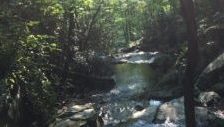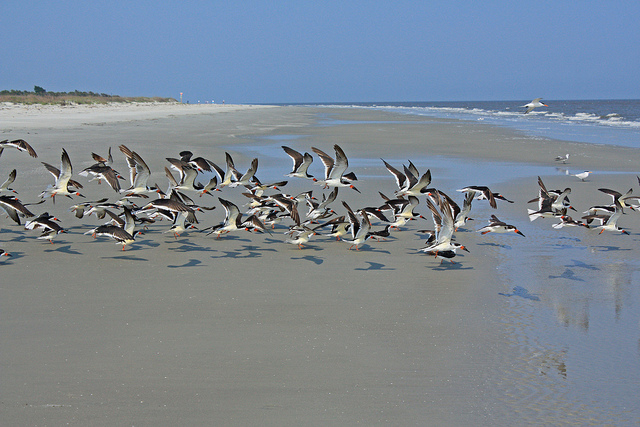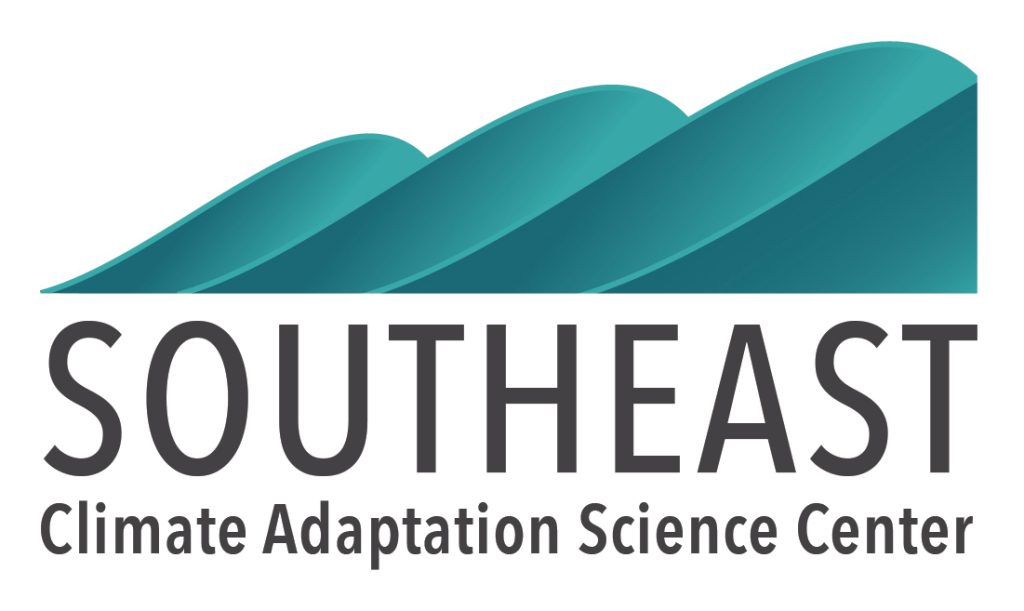March 2019 Newsletter

March 2019 Newsletter
Welcome to the Southeast Climate Adaptation Science Center’s March 2019 Newsletter.
In this newsletter you will find:
SE CASC News
Resources
Notable Publications
Tribal News
Regional Partner News
Webinars
Upcoming Events
Opportunities
For news and upcoming events related to the Southeast Climate Adaptation Science Center, subscribe to our monthly newsletter.
[divider]

Southeast Climate Adaptation Science Center News
SE CASC Global Change Fellows are partnering with the NC State College of Humanities and Social Sciences and the African American Cultural Center to host the opening of the RISING exhibit on March 28. The next Global Change Seminar, a panel discussion on Human Impacts of Sea Level Rise, leads off the grand opening event at 3:30 pm, followed by a student poster showcase and reception during the exhibit viewing. View the news release.
SAVE THE DATE for the Southeast CASC Regional Science Symposium, November 13 – 15, 2019. More details to come!
Asst. University Director, Aranzazu Lascurain, made a presentation, Highlights and Results from the 4th National Climate Assessment, on March 4, at United South and Eastern Tribes Impact Week. Tribal Climate Liaison, Casey Thornbrugh and Deputy USGS Director, Ryan Boyles participated in the week.
We’re excited to announce details of six science projects recently initiated to address management questions in the region, covering science topics varying from impacts on wildlife and plants to communicating future sea-level rise scenarios. Get more information.
New SE CASC supported publications:
SE CASC Research Ecologist, Mitch Eaton, is co-author of publication in Wildlife Research, Implementation of an occupancy-based monitoring protocol for a wide-spread and cryptic species, the New England cottontail (Sylvilagus transitionalis), which details a preliminary analysis of a new monitoring protocol developed to evaluate the population status of the threatened New England cottontail as a function of habitat conditions, survey conditions, and the possible influence of a competitor species.
SE CASC Researcher, Rob Dunn, co-authored Contemporary climatic analogs for 540 North American urban areas in the late 21st century, which uses climate-analog mapping to statistically match the projected climate of an urban area in 2080 to another city’s current climate. Read the web post.
SE CASC Researcher, Jen Costanza, and SE CASC Research Ecologist, Adam Terando, published Landscape Connectivity Planning for Adaptation to Future Climate and Land-Use Change, a new analysis of habitat connectivity studies. Get more detail in the blog post.
2015-16 Global Change Fellow, Rachel Atkins, and Auburn Co-PI, Karen McNeal, co-authored Exploring Differences Among Student Populations During Climate Graph Reading Tasks: An Eye Tracking Study. They used eye-tracking metrics to evaluate how different student groups interpret graphs of climate information.
2016-17 Global Change Fellow, Larry Long, and SE CASC Researcher, Steve Frank, published Urban forest fragments buffer trees from warming and pests, in which they show that trees in urban forest fragments are cooler and have lower pest density than trees in surrounding landscape.
2018 Global Change Fellow, Hadi Eshraghi, is lead author on new publication, US Energy-Related Greenhouse Gas Emissions in the Absence of Federal Climate Policy, which estimates U.S. emissions trajectory based on changes in energy technology and fuel prices.
SE CASC Researchers, Steve Frank and Rob Dunn, and 2015-16 Global Change Fellow, Kristi Backe are part of author team on Exotic urban trees conserve similar natural enemy communities to native congeners but have fewer pests, which concludes that exotic plants, particularly in pest-prone locations, can serve pest management and conservation goals. Read the blog post.
New web post: SE CASC Research in Print: A Review of 2018 Publications.
Related publications by SE CASC Faculty Affiliates:
Jen Costanza (NCSU): Towards connecting biodiversity and geodiversity across scales with satellite remote sensing.
Nils Peterson (NCSU): Educational attainment predicts negative perceptions women have of their own climate change knowledge, Developing an Instrument to Measure Autonomous Adaptive Capacity to Climate Change among Urban Households.
Paul Armsworth (Univ of TN): Designing markets for biodiversity offsets: lessons from tradable pollution permits.
Latest from Conservation Corridor: The prevalence and practice of connectivity in marine conservation planning.

Resources
FEATURED RESOURCE
Climate Reanalyzer
This interactive site is an excellent visualization tool for climate and weather datasets. Users can access climate information to reanalyze historical data, examine 10-day forecasts, and plot time series, maps, and correlation analyses. The data can also be exported in CSV format to be used in spreadsheets. The site is maintained by Dr. Sean Birkel with support from the Climate Change Institute, School of Earth and Climate Sciences at the University of Maine, and NSF. Learn more.
Science for Nature and People Partnership (SNAPP). The Nature Conservancy, Wildlife Conservation Society, and UC Santa Barbara’s National Center for Ecological Analysis, and Synthesis have joined together as a diverse team of experts dedicated to providing scientific solutions to global environmental challenges. Learn more.
BASINS Climate Assessment Tool. The BASINS Climate Assessment Tool (CAT) provides a flexible set of capabilities for exploring the potential effects of climate change on streamflow and water quality using different watershed models in BASINS. Learn More.
Hurricane Florence Storymap. The South Carolina State Climatology Office created an online journal about the impacts of Hurricane Florence. The storymap includes data, maps, summaries, and documentation of the historic rain and flooding unfolded in portions of the Pee Dee River. Learn more.
In the Media
As floods worsen, tide is shifting in climate-change debate. The Outer Banks Voice
Climate change impacts on fisheries. Science Magazine
Human Biases Could Help Save the Planet. Pew Charitable Trusts
It’s 2050 And This Is How We Stopped Climate Change. NPR
The Forest Service is working with tribes to manage wildfires. Yale Climate Communications
Traditional Ecological Knowledge. National Park Service

Notable Publications
Fire Refugia: What Are They, and Why Do They Matter for Global Change? Fire refugia are elements of landscapes that are relatively unaffected by fire, allowing ecosystems to benefit from increased protection through increased postfire function, biodiversity, and resilience to disturbances. This study addresses three main topics: How fire refugia have been defined in the scientific literature; theoretical frameworks that underlie their ecological function; and how fire refugia support ecosystem resilience under global change. Authors synthesize existing literature on fire refugia in the context of global change, developing a framework for considering the role of refugia for conservation and management purposes. Link to article.
Adaptation to Future Water Shortages in the United States Caused by Population Growth and Climate Change. Plain Language Summary. This study estimates the likelihood of water shortages over the remainder of the 21st century in 204 watersheds covering the contiguous United States. The estimates are based on monthly projections of water demand and renewable water supply in light of population growth and climate change, taking into account water storage and transbasin diversion capacities. The study then examines several possible adaptations to projected shortages, including water withdrawal efficiency improvements, reservoir storage enhancements, demand reductions, instream flow reductions, and groundwater depletions. Results provide a broad measure of the relative efficacy of the adaptation measures and show when and where the measures are likely to be helpful. Link to article.
Time of emergence of novel climates for North American migratory bird populations. Researchers used projections of weekly precipitation and minimum and maximum temperature climate variables under a high emissions scenario in the Western Hemisphere over a 280 year period (2021-2300) to estimate time of emergence (ToE) of novel climates — when climate is projected to pass a certain threshold of natural variability. ToE estimates are compared with weekly estimates of relative abundance of 77 passerine bird species that migrate in North America using models and eBird observations. The results highlight large seasonal and spatial variation in the formation of novel climates, and the ecological disruptions migratory birds are likely to encounter during this century due to changing climate. Link to article.
Global-scale dispersal and connectivity in mangroves. Mangrove ecosystems are highly susceptible to the effects of anthropogenic climate change and in particular, sea level rise. To increase understanding of mangrove species distributions, this study used a high-resolution, eddy- and tide-resolving numerical ocean model to simulate mangrove dispersal and connectivity. Authors found significant dispersal and connectivity across the Atlantic, Pacific, and Indian Oceans but no connectivity between the American and African continents. Additionally, mangrove dispersal routes were discovered and explored throughout the Pacific and Indian Oceans. Link to article.
A review of coastal management approaches to support the integration of ecological and human community planning for climate change. This study reviews challenges and information needs that impede systematic consideration in coastal planning and management of natural infrastructure, which has been found to contribute to the resilience of socio-ecological systems to sea level rise, storms, and flooding in coastal habitats. A variety of actions are proposed, derived from comparison of information on the benefits, opportunities, and challenges of implementing natural, grey, and hybrid infrastructure in the coastal zone across the U.S. Atlantic, Gulf of Mexico, and Caribbean coasts. Link to article.

Tribal News
Fifteenth Annual Southeast Indian Studies Conference. The purpose of the Southeast Indian Studies Conference is to provide a forum for discussion of the culture, history, art, health and contemporary issues of Native Americans in the Southeast. The conference serves as a critical venue for scholars, students and all persons interested in American Indian Studies in the region. The event will be held March 21-22, 2019, in the Museum of the Southeast American Indian at The University of North Carolina at Pembroke. Learn More.
The 2019 Southwestern Tribal Climate Change Summit (SWTCCS) provides an opportunity to come together, focus on climate strategies and solutions, and advance Tribal resilience efforts throughout the Southwest and North America. The 2019 Summit will be an interactive leadership-style retreat with small group breakout sessions, plenary style presentations on Tribal case studies, and a powerful climate training opportunity for student ambassadors. The application deadline is March 31. Apply here.
2019 National Tribal Forum on Air Quality. The National Tribal Forum on Air Quality (NTFAQ) provides an opportunity to meet, exchange ideas, and discuss current policies, regulatory initiatives, technical, and outreach topics in air quality. The NTFAQ is coordinated by The Institute for Tribal Environmental Professionals (ITEP) and the National Tribal Air Association (NTAA) through funding from the US Environmental Protection Agency (EPA). This event is hosted by The Pechanga Band of Luiseño Mission Indians and will be held from May 6-9, 2019 in Temecula, California. Learn More.

Regional Partner News
Gulf of Mexico Alliance: US Army Corps of Engineers South Atlantic Coastal Study Begins February 27th
Climate Adaptation Knowledge Exchange: Climate Change Adaptation Certification Tool
Association of Fish and Wildlife Agencies: State and Tribal Wildlife Grant Fly-In
Southeast Conservation Adaptation Strategy: Next steps for the AFWA Landscape Conservation Working Group
South Atlantic Landscape Conservation Cooperative: Hot off the press: User guides for the South Atlantic and Southeast Conservation Blueprints!

Webinars
Find more webinar information in our calendar.
Mar 19 | 12PM – 1PM | Carbon Cycling in North America’s Land–Ocean Aquatic Continuum
Mar 26 | 12PM – 1PM | All about Carbon: An Overview of the State of Carbon Cycle Report
Mar 28 | 3PM – 4PM | Forest Management for Mitigating Drought Impacts
Apr 3 | 12PM – 1PM | Climate Adaptation Science for Coastal Habitats, Species, and Ecosystems
Apr 9 | 12PM – 1PM | The Social Implications of Pervasive Carbon
View the One NOAA Science Seminar Series webinar schedule here.

Upcoming Events
Find more upcoming events in our calendar.
April 1-3 | Southeast and Caribbean Climate Community of Practice Workshop | Wrightsville Beach, NC
April 17 | North Inlet-Winyah Bay National Estuarine Research Reserve Coastal Wetlands Workshop | Georgetown, SC
May 23 | Cape Fear River Assembly Climate Resiliency Conference | Research Triangle Park, NC
June 11-13 | 17th Annual Climate Prediction Applications Science Workshop | Charleston, SC
Aug 25 – 29 | Safeguarding Water Quality in a Climate of Change | San Diego, CA
(Submit abstracts here by March 22.)
Oct 27 – 30 | Southeastern Association of Fish and Wildlife Agencies Conference | Hilton Head, SC
(Proposals for organized symposia are being accepted here until April 9)
At NC State
Mar 18 | Challenges and opportunities in modeling cross-scale, cross-sector feedbacks to inform critical decision-making in food-energy-water systems | 1216 Jordan Hall
Mar 19 | The Effects of Urban Environments on Trees and Their Herbivores | 3503 Thomas Hall
Mar 19 | Forecasting and Mapping of Coastal Flooding during Hurricanes | 4201 SAS Hall
Mar 20 | Increasing insect invasions all over the world: Can we predict the next ones? | 3503 Thomas Hall
Mar 21 – 22 | NC Water Resources Research Institute Annual Conference | Mckimmon Center
Mar 28 | Predators, Mutualists, and the Maintenance of a Genetic Polymorphism in the Spotted Salamander | 101 David Clark Labs
Mar 28 | Global Change Seminar: Human Story of Sea Level Rise | African American Cultural Center
Mar 29 | A Just Anthropocene? Water, Climate, Community, and Resilience | Hunt Library

Opportunities
Student Announcements
Fisheries, Wildlife, and Conservation Biology Graduate Assistantship application is now open. The successful student will complete a Master of Science in Fisheries, Wildlife, and Conservation Biology. Responsibilities will center on assessing and evaluating wildlife conservation priorities among Commissioners at wildlife agencies in southeastern states. The student will collaborate with SE CASC scientists, and The Southeast Conservation Adaptation Strategy group. Apply here by April 15.
Data Observation Network for Earth (DataONE) Summer Internship Program. Supported by the U.S. National Science Foundation, DataOne is offering four 9-week paid internships for current students and recent graduates. The selected applicant will work alongside a mentor to complete a pre-specified topic that aligns with the background and experience of the intern. Applications are due by March 22. More information.
Bureau of Indian Affairs, Office of Trust Services, Pathways Internship Program. Candidates must be currently enrolled full-time or accepted into a degree program in STEM fields. The program consists of multiple intern titles focused on natural and water resources, geographic information system, and conservation promoting the stewardship of natural and cultural resources related to the Department of Interior, BIA and Tribe missions. More information. Applications must be submitted by April 5 through USA Jobs here.
Research Grants
Climate Resilience Fund and NOAA are working together to align and synergize their annual grant opportunities. Applicants to the NOAA competition will be encouraged to pursue the opportunity to add to, enhance, or scale up their projects by applying to CRF’s annual ‘Coordination and Collaboration in the Resilience Ecosystem’ grants competition in early 2019. Check the CRF website for forthcoming details about this upcoming opportunity.
Wildlife Conservation Society (WCS) Climate Adaptation Fund provides grant awards to conservation non-profits across the U.S. to catalyze innovative, science-driven projects responding to the impacts of climate change on wildlife and people. A webinar will be held on March 12 for interested parties and will describe the fund and application process. Applications are due April 5. Learn more.
Science for Nature and People Partnership (SNAPP) has announced a request for proposals to fund Science to Solutions Teams. SNAPP funds teams of 12-20 people from diverse organizations to gather for 3-4 collaborative sessions over the course of 24 months. These working groups conceive new ideas, synthesize data relevant to their work, and deliver rapid solutions to the most critical challenges facing humans and our planet. Proposals are due by May 1 at 5:00PM. More information.
Gulf Research Program of the National Academies of Sciences, Engineering, and Medicine is offering up to $2.5 million in grants to support the development or testing of innovative theories, technologies, or methodologies that would help improve the understanding and prediction of the Gulf of Mexico Loop Current System by expanding the knowledge base or improving the tools available for observing and modeling the Loop Current System. Applications are due by June 5. More information.
Miscellaneous
Association of Fish & Wildlife Agencies partners are seeking nominations for the 2019 Climate Adaptation Leadership Award. Nominations will be accepted via online form until May 18. Individuals, groups, organizations, and government agencies are eligible to apply. More information.
- Categories:

